Fruit
Fruits that a Boxer Dog Can Eat
Overview
Maybe your Boxer has a history of looking at you with those huge eyes, just begging for the fruit that you eat or perhaps you've been thinking about adding something to his meals for a boost in nutrition, but aren't sure what would be best. If you're looking for snack alternatives or even better training treats, has fruit even come to mind? This section is going to cover fruits that you can and should give to your Boxer.
We'll go over:
- Why fruit is an important part of a Boxer dog's diet
- Which fruits are safe to eat, that most Boxers find super tasty
- Proper serving sizes and nutritional info
- How to incorporate fruit into your dog's diet
- Fruits to avoid and why
Why Give a Boxer Dog Fruit?
Dogs, much like humans, need protein, carbs and healthy fats. Many people think of rice, pasta and bread products when they picture carbohydrates and these 'simple carbs' do have their place. However, fruit is a simple carb that acts much like a complex carb in the body due to a high level of fiber. The fiber causes the natural sugar in fruit to be absorbed slowly, which prevents sugar spikes in the blood. These types of food are beneficial for energy, metabolism, digestion and good sleep.
Many types of fruit that Boxer dogs can eat are like little packs of power. They are crammed with vitamins and antioxidants. The antioxidants found in many fruits have been proven to help prevent many diseases… and for a dog breed like the Boxer that is prone to cancer, this alone is a reason to introduce more fruit to a Boxer's diet.
Additionally, just about all fruits that are safe for canine consumption are low in calories. Therefore, it's a super good choice for snacks and meal additions, since the benefits are great without adding calories that would cause unwanted weight gain.

Ella at 3.5 months old
Photo courtesy of Jaynee
Dogs that are resistant to eating their food often lick the bowl clean if fresh fruit is added to the kibble and blended in well. And finally, since the artificial coloring, flavoring and preservatives in many commercial treats should be avoided at all costs, offering fruit as a snack is an easy way to give a Boxer something wholesome & healthy without having to navigate the lists of ingredients found with many manufactured snacks.
Fruits that a Boxer Can and Should Eat
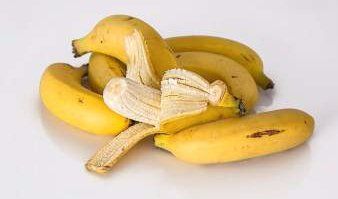
Bananas
- Boxer dogs can eat bananas and there are many reasons why this is a super healthy addition to meals or a great choice to give as a snack. Bananas are thought to help reduce bladder infection in canines and even help with proper bone formation in growing puppies.
These have good levels of potassium (422 mg) which is necessary for the proper functioning of enzymes, muscles, and nerves. It also helps the body maintain proper fluid levels and this is one reason why it's a good idea to give a banana to a Boxer dog after a bout with stomach issues like diarrhea or vomiting.
Bananas have no fat, cholesterol or sodium. Aside from the potassium, a medium sized banana has 3.1 grams of fiber, high levels of vitamin C and B6 and a good amount of magnesium.
Most Boxer dogs find these to be really tasty and these are great to give fresh (mixed into a meal) or even frozen, which dogs seem to love. Serving size for a Boxer puppy
is 1/2 of a banana, cut into slices, which is 52 calories. An adult Boxer dog can easily eat 1 whole medium sized banana, at 105 calories. If you're giving this as small treats or as reward, slice it up and freeze it... 2 to 3 slices can be given at a time.
Do please note that Boxer dogs with Addison's disease or kidney disease should not be given bananas.
Cantaloupe
- Most owners don't automatically think about giving a Boxer dog cantaloupe, but this is a great fruit to incorporate into a dog's diet.
This fruit is safe for canines to eat and it contains high levels of vitamin A in the form of carotenoids (not as much as carrots, but still a good amount - 3,138 micrograms per 100 grams vs 8,300 micrograms). While vitamin A can keep a dog's eyes healthy (it affects both the retina and cornea), it also plays a part in the health of both teeth and bones.
Cantaloupe also has lots of vitamin C, fiber, magnesium, thiamine, niacin, folic acid and potassium.
The great thing about giving cantaloupe to a Boxer dog is that it also a rood rich in antioxidants (super good for maintaining good health
and fighting diseases) and anti-inflammatory phytonutrients (nutrients that lead to healthy tissues and organs, detoxifies the body of foreign substances, boosts the immune system and helps muscles stay strong).
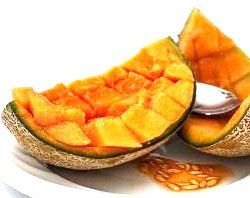
A Boxer dog can easily gulp down a huge bowl of diced cantaloupe, so do offer this in measured quantities. A good serving size for a growing puppy is 1 cup cut into small pieces (54 calories) and adult Boxers can either be given a few frozen pieces or wedges (without the rind) at a time for treats or 1 to 1 and 1/2 cup mixed into food. (81 calories for 1.5 cups).
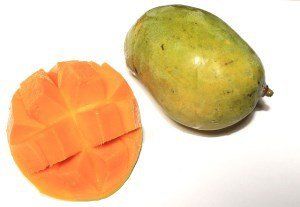
Mango
- Boxer dogs love mangos and these are safe for canines to eat. As with many fruits, the pits of these are toxic, so never give a full mango to your Boxer. Mangos are a healthy fruit choice for dogs because they are packed with lots of vitamins including A, B6, C and E.
The high levels of vitamin C found in mangos can help with everything from allergies (you may be surprised to know that it is a natural antihistamine) to skin issues (this is relevant because it is not uncommon for Boxer dogs to suffer from acne
particularly during adolescence) to lowing the risk of hearth issues and even neurological disorders.
The B6 in mangos helps with skin, liver, eye and fur health in dogs. Like many fruits, this can be given fresh or frozen. Boxer puppies will love to lick some frozen pieces during the summer and dogs of any age find the subtle sweetness a good addition when mixed into meals.
A good serving size is 1/2 cup for puppies (107 calories) and 1 cup of slices for adult Boxers (214 calories). A good sized mango is equal to about 1 cup, without the pit, which you want to remove since it is poisonous.
Pears
- This is another fruit that is not always mentioned on the list of fruits a dog can eat, however it is very safe for consumption and super healthy to boot. We are, however, talking about fresh pears and not the super sugary pears slices that can be found in cans or pre-packaged small plastic serving bowls.
With a fresh pear, there is no cholesterol, sodium or fat. What you will find is an array of nutrients including dietary fiber (good for digestion), vitamin C (as mentioned above, beneficial in many ways), potassium, copper and magnesium. Magnesium is often overlooked, but is an important mineral that aids in the formation of bones & teeth
and helps keep the heart healthy. If a dog (or person) is low in this and has a deficiency, it is thought to contribute towards 22 different conditions and diseases. Pears also have a low glycemic index, which means it is a slow acting 'good' carb.
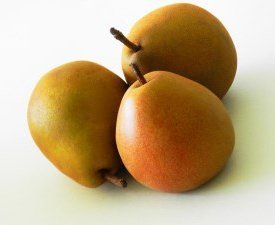
Pears are great cut up into pieces and added to meals, mixed with other ingredients for snacks (more ahead) or given after being chilled in the freezer. Just be sure to cut around the core and throw that out since it is toxic as with other fruits and peel it as well, since dogs do best without the skin.
One medium pair has just 102 calories. A young pup will love a good 3/4 cup and adults can easily eat a full pear, sliced up into bite sized pieces.
-279x200.dm.edit_ziJB6j-1920w.jpg)
Watermelon
- Watermelon is a super hydrating food for Boxer dogs that don't meet their daily water requirements
by drinking alone since it is 92% water. In many locations this is a summer fruit and can be a great treat, given in chunks or frozen. As you can imagine, it is also pretty high in sugar since it tastes so sweet. In fact watermelon is about 6% sugar, so while this is safe and healthy for Boxer dogs to ingest, you'll want to limit how much you give your puppy or dog.
Another element to note is that due to the sugar content, this is a good food to give to a young pup that has minor hypoglycemia (low blood sugar) which is not uncommon with new puppies and is often due to not eating often enough or stress (moving to a new home, feeling overwhelmed when meeting new people, etc.)
You'll want to choose the seedless variety (it's fine if a Boxer dog eats the small little white seeds in watermelon) and don't give him a wedge of it still on the rind.
This is also extremely low in calories, so there's no need to worry about a Boxer dog getting overweight
due to watermelon. Puppies will love a cup or so (84 calories) and adult Boxers, though they could gobble down a whole watermelon, two cups is just fine since it has such a high water content. When you're giving this for reward during training, freeze the pieces so that they don't get mushy.
Blueberries
- We're saving one of the best for last. Blueberries are one of the best fruits to give to Boxer dogs of all ages. These are one of the healthiest foods in the world and are jammed packed with antioxidants. These awesome berries have a flavonoid called anthocyanins; it gives them their color but also boosts their disease fighting capabilities. The blend of nutrients in blueberries include vitamin B6, & C, magnesium, potassium, dietary fiber and iron.
If you can, grab organic ones for you and your Boxer dog as opposed to those conventionally grown; numerous studies have shown that organic blueberries (even after being frozen for up to 3 months) have higher concentrations of antioxidants (delphinidins, malvidins, and petunidins).
When frozen, these are super easy to dole out as reward for both training and good behavior. Fresh berries can be mixed into meals or into easy to make snacks (more ahead). One cup has only 85 calories.
For reward, a few frozen ones at a time work well. And when mixing into meals or other blended food, up to 1/3 cup for growing puppies and up to 1/2 cup for adult Boxers can be given each day; though you may want to stir in these along with the next fruit.
Raspberries
- These are a close second to blueberries in regard to highly healthy fruits for dogs that are safe to eat. They have a bit less vitamin C, but more calcium and fiber. Antioxidant qualities are almost equal, in particular anthocyanins, a class of antioxidants that may guard against gastrointestinal cancer.
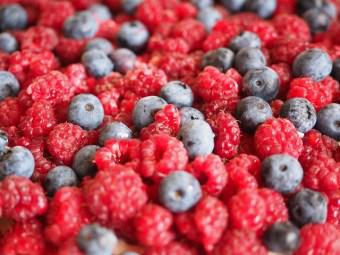
Calories are a tad less, with 64 calories per cup. It should be noted that both blueberries and raspberries are considered to be fruits with high water levels; 85 and 87% respectively.
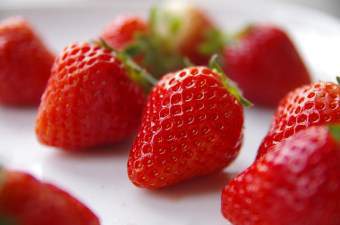
Strawberries
- Strawberries are safe for Boxer dogs to eat and it's a good thing since it may be hard to keep these sweet little fruits all to yourself. This fruit has tons of vitamins and minerals including vitamins B1 (also known as thiamine or thiamin, it helps the body convert carbs into fuel and metabolize both fats and protein), B6 (helps carry signals from nerves, helps regular hormones that affect mood), C (skin, bone and blood health) and K (essential for strong bones and heart health).
If you let a Boxer dog just go at it, he could eat an entire strawberry field, so you'll want to give this in moderation. They are super low in calories, each has just 4! Give 3 to 4 to puppies and up to 6 to adults.
Oranges
- These super sweet citrus fruits are okay for dogs to eat; though the level of acidity means that you'll want to limit how many orange slices you give to your Boxer dog. Just one or two for puppies and 4 or 5 for adults is a good serving size. Oranges are a low glycemic food, so there shouldn't be any sort of sugar rush with these small portions.
As you probably know, oranges are packed with vitamin C (you'll see this listed as ascorbic acid on dog food labels), which helps protect cells in the body and keeps tissue, organs, skin, bones, teeth and blood vessels healthy. It is interesting to note that high levels of stress deplete the body of vitamin C; this includes not only physical stress from lots of exercise, but emotional stress as well such as long bouts of separation anxiety.
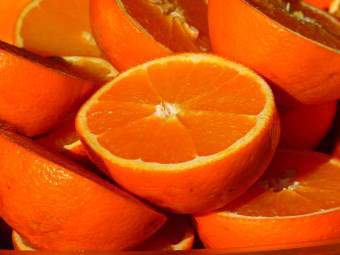
This is a rather low calorie food, which just 45 calories in a medium sized orange.
Depending on the season and variety of orange that you purchase, this fruit can have tiny white seeds that are fine to ingest or rather large grayish-brown seeds that should be removed before you give this to your puppy or dog.
Other Fruits
- There are some other fruits that a Boxer dog can technically eat, though with these the fruit is rather small in comparison to the pit (which is toxic) and for this reason it's often not worth the prep time: peaches, kiwi, plums and nectarines. Pineapple is safe for dogs to eat, however this only refers to fresh pineapple and the majority of shoppers opt for the canned diced pieces for themselves which have far too much sugary syrup.
Incorporating Fruit into a Boxer Dog's Diet
Fruit is often enjoyed by dogs just as it is without any added ingredients. Alternatively, if you are looking for a way to boost your dog's meals, mixing in one or more of the above mentioned fruits into meals is almost always well received.
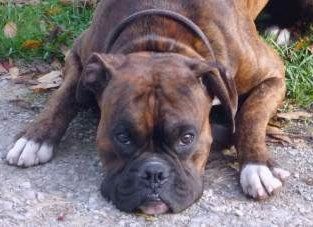
Braunson
Photo courtesy of Marianne Yates
For a special treat (canine dessert) a healthy choice that's easy to incorporate is whole white yogurt. It's important to note that this refers to whole white unflavored yogurt and not the type that has any artificial sweeteners or flavors. Yogurt (though it is a dairy product) is tolerated very well by most dogs when given in moderation. The active bacteria in it works as a probiotic and is thought to possibly help a dog maintain a healthy digestive system as it does with humans, though more studies need to be done to conclusively prove this.
Some vets recommend yogurt after a dog has gone through a course of antibiotics since the medicine can cause yeast infections and this food can keep that at bay. One cup is 249 calories.
A fun & easy recipe is to mix yogurt with both blueberries and raspberries and then freeze the mixture into an ice cube tray. Once frozen, this makes super tasty treats that Boxers tend to love.
Another option is cottage cheese. This is high in both protein and calcium and while it is a dairy product (which means you should not give too much, i.e. 3 times per day) it can have its place in a dog's diet. Many owners have found that offering a cup of cottage cheese can help a Boxer gain weight when he is going through his adolescent skinny phase.
Fruits to Avoid
You may already have this small list memorized, but it's worth repeating for those that do not. In addition, you may know which fruits are toxic but may be wondering why exactly that is; though surprisingly the exact mechanism of the poisoning is unknown for a couple of these. Let's sort through this:
Dogs can NOT eat:
Avocado
- There is a lot of misleading info about this fruit. It does contain a toxic, called persin, that poisonous to other animals (most notably birds and cattle), but not to dogs. Some sources list this as a fruit toxic to canines for that reason alone even if it doesn't make sense. However, the size
and shape of this is considered a possible choking hazard for dogs when given whole and if a dog hypothetically swallowed an avocado (which an adult Boxer dog could do), the large seed could cause internal blockage.
Grapes & Raisins
- In 2004, the Animal Poison Control Center (APCC) officially announced that grapes and raisins were toxic to dogs. But, oddly, there are only theories about why canines can become very ill. It is
clear that ingestion can cause a toxicity that in turn leads to acute kidney failure. If a dog were to accidentally ingest grapes or raisins (and studies show that it's even more dangerous when the two are eaten together), this is considered an immediate medical emergency. Treatment includes induced vomiting (if it has been under 2 hours), activated charcoal, IV intervention and blood dialysis.
Currents
- Current berries, often used to make jams and jellies, are toxic to a moderate degree. The black ones are more potent than the red; though ingestion by a dog of any type of current berry or product made with them can be dangerous. The exact element that canines react to is unknown.
Cherries
- The actual flesh of this fruit is okay for dogs to eat, however it is on the list of 'do not eat' because it is awfully tedious to pit a cherry and the pits are toxic, as with many seeded fruits.
Any cores or pits of any fruit
- No doubt you know that the seeds and pits of just about all fruits are toxic to dogs. You may be surprised to know exactly why this is. They contain amygdalin, which is a type of cyanide and sugar compound. When this is metabolized, it degrades into hydrogen cyanide. Hydrogen cyanide is terribly toxic. If it enters the body, it cuts off the blood's ability to carry oxygen and often leads to death. But a person (or even a dog) wouldn't die if they swallowed
one apple seed and this is because the seeds are protected by a super hard coating that allows them to pass through the digestive system intact.
Dogs have much sharper teeth than humans and a stronger bite force (though bite force is less with small, toy sized dogs of course).
Since dogs can hypothetically crush seeds, releasing the poison, this is why it is so risky for them to chew on any pit, core or seeds.

RJ (Rowdy Jr.)
"This is how we watch TV"
Photo courtesy of Brandi Lavender
Tips for Giving Your Boxer Fruit
1) Wash the fruit.
Sometimes people think of dogs as having indestructible stomachs that can handle things that human bodies cannot. However, much of that is myth.
Dogs can get Salmonella and E.coli poisoning from raw meats, they can suffer long term health effects from drinking unfiltered tap water and they can have bad reactions to the pesticides that are on fruit.
When you give any of the above listed safe fruits to your Boxer dog, be sure to thoroughly wash them beforehand, just as you would do for yourself. Buying organic can help with this issue.
The top 5 fruits that said to have the most pesticides on them are apples, strawberries, grapes, peaches and imported nectarines.
The 5 fruits that are considered among the 'cleanest' are mangos, pineapple, papayas, avocadoes and kiwi (but Boxer dogs shouldn't eat the last 2).
2) Keep it in moderation.
While you may love the fact that you've found a new, healthy food to give to your Boxer puppy or dog, don't get carried away. Stick to moderate amounts and never give just fruit in place of his normal food for meals. Fruit can be great snacks, treats for dessert and additions to meals (throw in some fresh veggies too!).
3) Freeze leftovers.
If you find yourself with sections of extra fruit that you don't want to go bad, you can freeze them which allow them to last for months; some can last for up to a year. You'll want to place the fruit in plastic freezer bags.
You may also like:
Having more than one Boxer
- The challenges and joys of having multiple Boxers in your house.
AllBoxerInfo.com All content is protected by US and International copyright laws. All rights reserved.
We are a participant in the Amazon Services LLC
Associates Program, an affiliate advertising program designed to provide a means for us to earn fees by linking to Amazon.com and affiliated sites.
